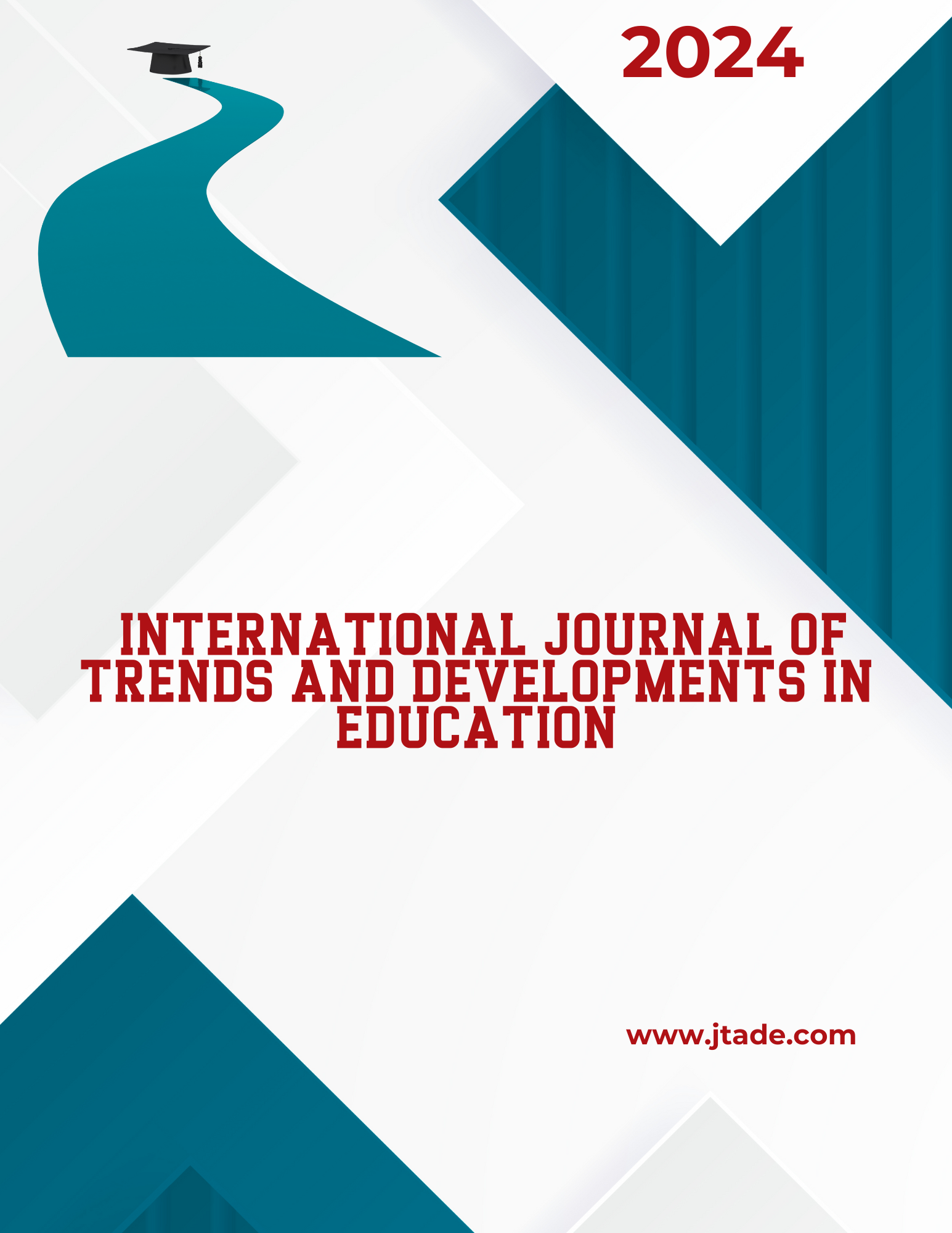Research article | Open Access
International Journal of Trends and Developments in Education 2025, Vol. 5(1) 1-15
Understanding Teachers’ Perceptions and Knowledge of the European Union
pp. 1 - 15 | DOI: https://doi.org/10.5281/zenodo.14843401
Publish Date: June 30, 2025 | Single/Total View: 220/116 | Single/Total Download: 235/123
Abstract
This study examines Turkish teachers' perceptions and knowledge of the European Union (EU) in the context of cultural, political, and educational impacts. Utilizing a descriptive survey design, data were collected from 484 teachers working in Kocaeli during the 2024–2025 academic year. A validated survey instrument, including the European Union Perception Scale, was employed to evaluate anxiety, perceived contributions, and cultural concerns regarding the EU. Descriptive and inferential statistical methods were applied for analysis.
Findings revealed a significant level of anxiety among teachers regarding the EU, with an arithmetic mean of 4.00 (SD = 0.81) on the anxiety dimension. Perceived contributions and cultural factors yielded mean scores of 3.26 (SD = 0.95) and 3.07 (SD = 1.22), respectively, indicating neutrality and uncertainty. Teachers expressed skepticism toward the EU's commitment to Turkey, with 78.9% perceiving insincerity in the prolonged membership process. Furthermore, concerns about cultural impacts were prominent, as 39.5% feared potential harm to Turkish cultural norms.
The study underscores the complex relationship between Turkey and the EU, shaped by cultural identity and geopolitical dynamics. Teachers' perspectives highlight the need for informed engagement with EU principles while preserving national traditions. These findings suggest that improving teachers' political and cultural literacy may alleviate concerns and foster constructive dialogue on EU integration.
Keywords: European Union, Perceptions, Teachers, Anxiety, European Union Values
APA 7th edition
Chami, A., Bayrakci, M., Taskin, M., Konak, H., & Bayrakci, C. (2025). Understanding Teachers’ Perceptions and Knowledge of the European Union. International Journal of Trends and Developments in Education, 5(1), 1-15. https://doi.org/10.5281/zenodo.14843401
Harvard
Chami, A., Bayrakci, M., Taskin, M., Konak, H. and Bayrakci, C. (2025). Understanding Teachers’ Perceptions and Knowledge of the European Union. International Journal of Trends and Developments in Education, 5(1), pp. 1-15.
Chicago 16th edition
Chami, Asma, Mustafa Bayrakci, Mustafa Taskin, Hasan Konak and Cansu Bayrakci (2025). "Understanding Teachers’ Perceptions and Knowledge of the European Union". International Journal of Trends and Developments in Education 5 (1):1-15. https://doi.org/10.5281/zenodo.14843401
- McCormick, J. (2020). Understanding the European Union: A concise introduction. Google Books. [Google Scholar]
- Phinnemore, D. (2013). The European Union: Establishment and development. Google Books. [Google Scholar]
- Goebel, R.J. (2003). Joining the European Union: The accession procedure for Central European and Mediterranean states. HeinOnline. [Google Scholar]
- Stivachtis, Y.A. (2008). Civilization and international society: The case of European Union expansion. ResearchGate. [Google Scholar]
- Medvec, S.E. (2009). The European Union and expansion to the East: Aspects of accession, problems, and prospects for the future. JSTOR. [Google Scholar]
- Cameron, F. (2004). The future of Europe. Taylor & Francis. [Google Scholar]
- European Commission. (2021). 2021 Report on Turkey. [Google Scholar]
- Küçük, B. (2020). Turkey's Geopolitical Role: A Bridge Between Continents. [Google Scholar]
- European Council on Refugees and Exiles. (2016). The EU-Turkey Agreement: An Overview. [Google Scholar]
- Yılmaz, K., & Yiğit, Ö. (2010). Pre-service social studies teachers' perceptions of Europe, the Middle East, and the neighboring countries of Turkey. [Google Scholar]
- Tarman, B. (2010). Global perspectives and challenges on teacher education in Turkey. [Google Scholar]
- Arslan, S., & Curle, S. (2024). Institutionalising English as a foreign language teachers for global sustainability: Perceptions of education for sustainable development in Turkey. [Google Scholar]
- İnci, S., & Yıldız, S. (2019). Perceptions of English Teachers in Turkey and Germany. [Google Scholar]
- Wilkins, C., Lawson, T., & Busher, H. (2010). European Citizenship and European Union Expansion: Perspectives on Europeanness and Citizenship Education from Britain and Turkey. [Google Scholar]
- Aslan, G. (2017). Multiculturalism in Turkey: An Evaluation of Teachers’ Competency Perceptions. [Google Scholar]
- Brooks, R. (2018). Education and European Identity in the United Kingdom and the European Union. Journal of Education Policy, 33(4), 501-516. [Google Scholar]
- Fairbrother, G. (2019). Teachers and EU Integration in Eastern Europe: Tensions and Perspectives. Eastern European Education Journal, 27(2), 123-139. [Google Scholar]
- Fielding, M., & Vidovich, L. (2017). French Teachers and the European Union: Balancing National and European Identities in Education. European Journal of Education, 52(3), 312-329. [Google Scholar]
- Keating, A., & Janmaat, J.G. (2016). Education, Democracy, and National Identity in Germany and Europe. Comparative Education Review, 60(4), 607-630. [Google Scholar]
- Wilkins, C., Lawson, T., & Busher, H. (2010). European Citizenship and European Union Expansion: Perspectives on Europeanness and Citizenship Education from Britain and Turkey. Journal of Social Science Education, 9(1), 45-58. [Google Scholar]
- Cohen, L., Manion, L., & Morrison, K. (2000). Research Methods in Education. Routledge. [Google Scholar]
- Baldwin, D. (1995). The Concept of Security. Review of International Studies, 23(1), 5–26. [Google Scholar]
